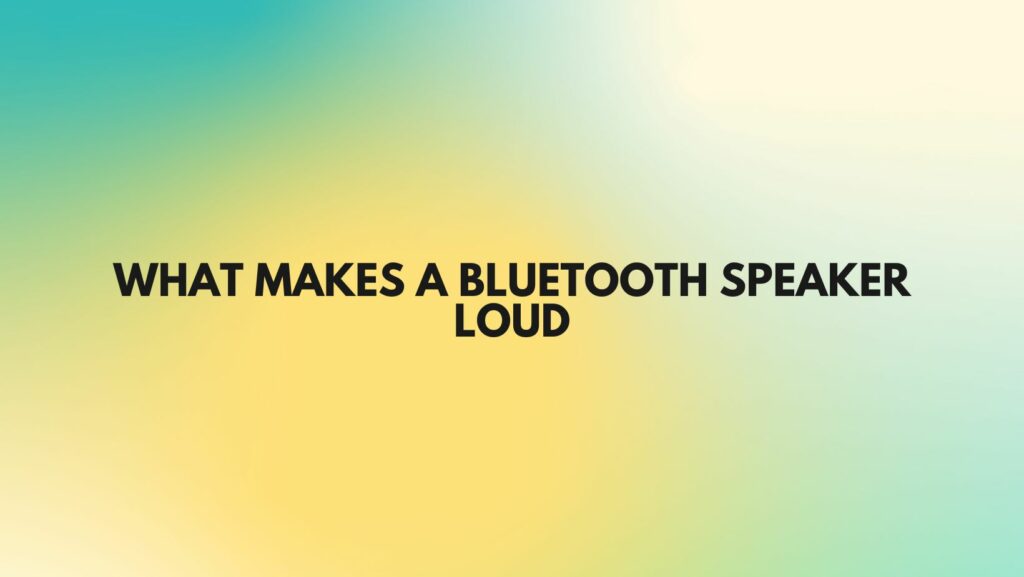Bluetooth speakers have revolutionized the way we enjoy music and audio on the go. From picnics in the park to impromptu dance parties in the living room, these portable devices have become a ubiquitous part of our daily lives. One of the most crucial factors to consider when purchasing a Bluetooth speaker is its volume or loudness. But what makes a Bluetooth speaker loud? In this comprehensive guide, we will explore the various factors that contribute to the loudness of a Bluetooth speaker.
- Speaker Size and Design
The size of a Bluetooth speaker is one of the most critical factors that influence its loudness. Generally, larger speakers tend to be louder than smaller ones. This is because larger speakers have more room for drivers, which are the components responsible for producing sound. Additionally, larger speakers often have bigger cabinets, which allow for more significant air displacement, resulting in a more powerful sound.
- Driver Configuration
Inside a Bluetooth speaker, you will typically find one or more drivers responsible for producing sound. The two most common types of drivers are woofers and tweeters. Woofers are responsible for low-frequency sounds (bass), while tweeters handle high-frequency sounds (treble). Speakers with multiple drivers often provide a more comprehensive sound range, making them capable of producing louder, clearer audio.
- Amplification
Amplification plays a crucial role in making a Bluetooth speaker loud. The amplifier takes the audio signal from the source (your smartphone, tablet, or other devices) and increases its power before sending it to the speaker drivers. A higher-powered amplifier can drive the speakers more effectively, resulting in greater volume.
- Battery Power
For portable Bluetooth speakers, the battery power is a significant factor influencing loudness. The amount of power the battery can supply directly affects the amplifier’s performance and, consequently, the speaker’s loudness. When choosing a Bluetooth speaker, consider the battery’s capacity and its impact on the device’s playtime and overall loudness.
- Frequency Response
A speaker’s frequency response refers to its ability to reproduce a wide range of frequencies. A Bluetooth speaker with a broader frequency response can deliver a more dynamic sound experience, including deeper bass and higher treble, which contributes to its perceived loudness. When looking for a loud Bluetooth speaker, check for one that offers a balanced frequency response.
- Audio Codec and Bluetooth Version
The Bluetooth version and audio codec used can also impact the speaker’s loudness and sound quality. More advanced Bluetooth versions (e.g., Bluetooth 4.0, 4.2, 5.0) often provide better data transfer rates, resulting in higher audio quality and potentially louder sound. Moreover, the choice of audio codec, like aptX, AAC, or SBC, can influence the quality of audio transmission and thus loudness.
- Enclosure Design
The design of the speaker’s enclosure or cabinet can influence its loudness. Well-designed enclosures can prevent sound distortion and provide better acoustics, resulting in a louder and cleaner sound output. Factors such as porting and materials used in the enclosure construction can impact the speaker’s overall performance.
- Sound Processing
Many Bluetooth speakers come equipped with sound processing technologies that enhance their loudness. These technologies may include equalization, sound enhancement algorithms, and adaptive audio processing. They help optimize the audio output for the best loudness and sound quality based on the content being played.
- Room Acoustics
The environment in which you use your Bluetooth speaker can significantly affect its perceived loudness. In an open, outdoor space, you may need a more powerful speaker to overcome ambient noise, while in a smaller, enclosed room, even a moderately loud speaker may suffice. Consider the surroundings when evaluating a Bluetooth speaker’s loudness.
Conclusion
Choosing a loud Bluetooth speaker involves considering various factors, including size, driver configuration, amplification, battery power, frequency response, audio codecs, enclosure design, sound processing, and the acoustic environment. The interplay of these elements determines how loud a Bluetooth speaker can be and how well it performs in different scenarios.
Ultimately, the “loudness” of a Bluetooth speaker is subjective and depends on your specific needs and preferences. What may be loud enough for a picnic might not suffice for a dance party. Therefore, it’s essential to evaluate these factors carefully and select a Bluetooth speaker that meets your requirements, whether you prioritize portability, sound quality, or sheer volume.


